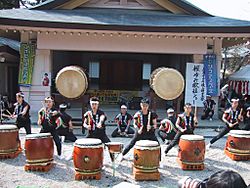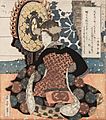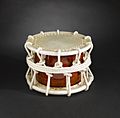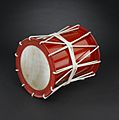Taiko facts for kids

|
|
| Percussion instrument | |
|---|---|
| Other names | wadaiko, taiko drum |
| Classification | Percussion |
| Hornbostel–Sachs classification | 212.2 (Instruments in which the membrane is struck directly, which have tubular bodies.) |
| Inventor(s) | Unknown, origin possibly from India, China, or Korea. |
| Developed | 5th-7th century CE |
The word Taiko (error: {{nihongo}}: Japanese or romaji text required (help)) simply means "drum" in Japanese. Outside of Japan, "Taiko" usually refers to any type of Japanese drum. It also describes the exciting art of Taiko drumming groups, often called "kumi-daiko" (組太鼓). Taiko drums make a very loud, deep sound.
Contents
What is Taiko?
Taiko drums are a big part of Japanese culture. They have been used for many centuries. Long ago, a very large drum called an odaiko helped mark the edges of a village's land. This showed how far the village reached.
Today, Taiko drumming is mostly a performance art. You can see it at festivals or in concerts. It's a powerful and exciting show.
The History of Taiko
Taiko drums have a long history in Japan. Some people believe they came from places like India, China, or Korea. They have been around since at least the 5th to 7th centuries CE.
In 1951, a person named Daihachi Oguchi helped create the modern Taiko drumming style. He brought together different drums and rhythms. This led to the "kumi-daiko" style we see today.
Famous Taiko Groups
One of the most famous Taiko groups is 'Kodo'. Their name means "heart-beat." Kodo is known worldwide for their amazing performances. They also work to keep many traditional Japanese art forms alive.
The members of Kodo live together on an island called Sado Higashima. They live in a traditional way. This helps them stay connected to the history of Taiko.
Taiko Around the World
Taiko drumming has become popular in many countries. People in Germany, the United States, and Australia have started their own Taiko groups. This shows how much people love the powerful sound and energy of Taiko drums.
Many different kinds of people play Taiko. Since the 1990s, there have been just as many female performers as male performers in Taiko groups.
Images for kids
-
Haniwa statues from the 6th century CE show early Taiko use.
See also
 In Spanish: Taiko para niños
In Spanish: Taiko para niños
 | Kyle Baker |
 | Joseph Yoakum |
 | Laura Wheeler Waring |
 | Henry Ossawa Tanner |



















